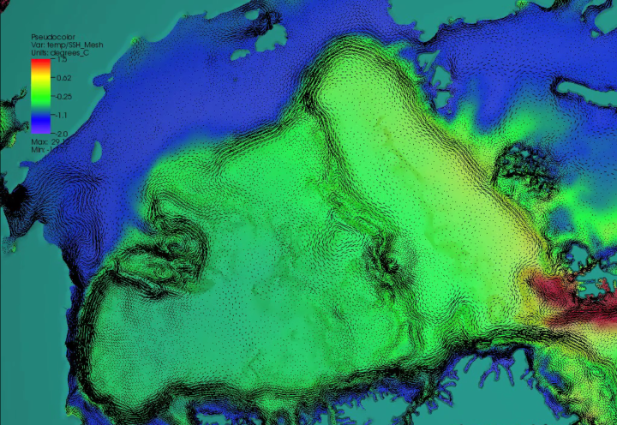UMass Dartmouth School of Marine Science and Technology (SMAST) researchers examine significant impact of climate change on sea ice variation
/prod01/production-cdn-pxl/media/umassdartmouth/news/2016/Fig.3_Introducing-the-model-of-FVCOM.JPG)
The Arctic Ocean plays a significant role in the global ocean circulation and water exchange as a connection between the Pacific Ocean and the Atlantic Ocean. The Arctic outflow drifts out of the Arctic Ocean and into the North Atlantic Ocean through two main pathways: the Fram Strait and the Canadian Arctic Archipelago (CAA), which encompasses copious islands, straits, and narrow and shallow channels.
Ice formation and melting is one of the major sources controlling the variability of freshwater content in the Arctic, which directly contributes to the freshwater torrents into the North Atlantic Ocean. Therefore, sea ice is a key regional feature of the Arctic Ocean and a sign of global climate change.
SMAST PhD candidate Yu Zhang, along with his faculty advisor and Principal Investigator on the project Dr. Changsheng Chen (Professor at UMass Dartmouth) and collaborating scientists at Woods Hole Oceanographic Institution and Shanghai Ocean University, are currently studying the seasonal and interannual variability of sea ice characteristics. Key factors include sea ice extent, concentration, drift velocity, and thickness.
The team is also examining the significant impact of climate change on the sea ice variation and researching the relation of sea ice to atmospheric forcings. To accomplish their goal, Zhang and team have developed a high-resolution, unstructured-grid, fully ice-sea coupled Arctic Ocean Finite-Volume Community Ocean Model (AO-FVCOM) to simulate the seasonal and year-to-year variability of sea ice and current circulation in the Arctic Ocean.
 “Our goal is to explore the long-term variability of the CAA outflow and its impacts on the Arctic basin-scale circulation and its relationship to basin-local forcings with the main purposes of evaluating the performance of the AO-FVCOM in capturing the seasonal and interannual variability of the CAA outflow," said Zhang. "We are qualifying the key physical driving mechanism to control this variability, and examining the linkage of the CAA outflow with the basin-scale circulation and outflow through Fram Strait.”
“Our goal is to explore the long-term variability of the CAA outflow and its impacts on the Arctic basin-scale circulation and its relationship to basin-local forcings with the main purposes of evaluating the performance of the AO-FVCOM in capturing the seasonal and interannual variability of the CAA outflow," said Zhang. "We are qualifying the key physical driving mechanism to control this variability, and examining the linkage of the CAA outflow with the basin-scale circulation and outflow through Fram Strait.”
The research and findings are pivotal given that over the last four decades, the sea ice cover area in the Arctic has dramatically changed. From the period of 1978-2014, the thinning of the sea ice thickness co-occurred with the declining of the sea ice area. The melting sea ice will force the global sea level rise. “Under this situation, if we can use a state-of-art numerical model to forecast the variation of sea ice, we will estimate the sea level rise in advance according to the amount of sea ice melting and take actions to protect these regions in time,” said Zhang.
Zhang and his collaborators conclude that this acceleration of sea level rise can considerably influence human populations in coastal and island regions. The Arctic Ocean circulation also affects the natural environments like marine ecosystems in Gulf of Maine.
In the Arctic Ocean, there is a strong along-slope current which is called the Labrador Current from the Greenland coast. "This current carries relative cold and fresh water from the Arctic Ocean and flows southward into the Gulf of Maine along the continental slope,” said Zhang. “The changes of temperature and salinity in the Gulf of Maine caused by this current can influence the distribution of marine animals and the fisheries resources.”
Funding & Collaborations
This research project is supported by two National Science Foundation (NSF) grants. Robert C. Beardsley, Scientist Emeritus, Woods Hole Oceanographic Institution; Andrey Proshutinsky, Senior Scientist, Woods Hole Oceanographic Institution; and Guoping Gao, Professor, Shanghai Ocean University are co-collaborators on the project. Collaborating organizations and agencies include Shanghai Ocean University, Sun Yat-Sen University, University of Washington, and the Woods Hole Oceanographic Institution.
About Yu Zhang
Yu Zhang is currently a PhD candidate at UMass Dartmouth’s School for Marine Science & Technology (SMAST). He previously attended East China Normal University (ECNU) where he earned a BS in Physics in 2009. In addition to co-authoring various published papers, Zhang is the 2016 inaugural recipient of the American college award titled "Student Excellence Award" established by UMass Dartmouth.